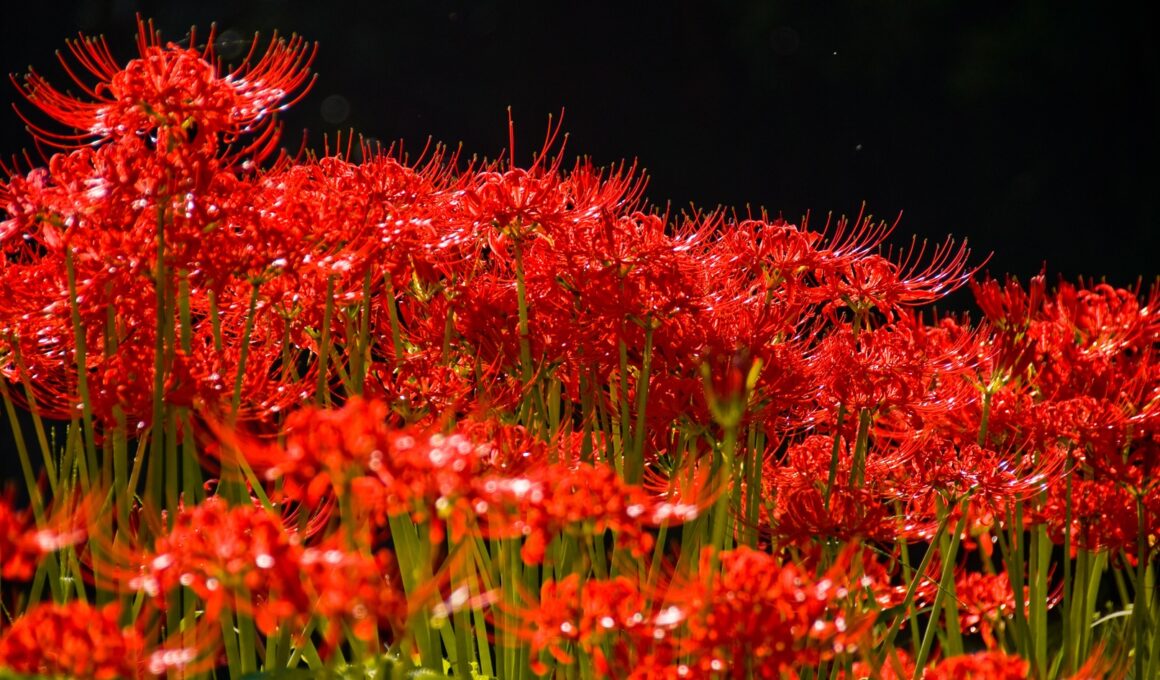The spider lily is named for its long, thin petals, which resemble the legs of a spider. If you are interested in learning more about the spider lily flower, keep reading! In this article, we will discuss everything you need to know about this flower, including its history, care instructions, and more!
What Are Spider Lilies? Overview
Spider lilies are a type of flowering plant that gets its name from the shape of its blooms. The flowers are typically white, red or pale pink and have long, thin petals that radiate out from the center like the spokes of a wheel. The plants also have dangling seed pods that resemble spider legs, hence their common name. Spider lilies are native to Asia and Central America and can be found growing in damp, shady areas such as woodlands and wetlands.
Symbolism & Meaning of These Magic Lilies
In some cultures, spider lilies are considered to be symbols of death and are often associated with funerals and graveyards or simply with goodbyes & farewells. However, in others, they are seen as symbols of hope, being unique and new beginnings, making them popular flowers for weddings and other celebrations. They can also mean a star-crossed love.
How & When Do Spider Lily Flowers Bloom?
Fall is a time of change. The leaves start to turn, the air gets crisp, and nature starts to prepare for winter. For gardeners, it’s also a time to enjoy the last blooms of the season. One of the most beautiful flowers of autumn is the spider lily. These delicate blooms add a touch of elegance to any garden, and they’re surprisingly easy to care for. Here’s everything you need to know about when spider lilies bloom and how to make them bloom.
Sun & Soil for a Better Bloom
Spider lilies are bulbs that bloom in the fall (especially red spider lilies). They like full sun and well-drained soil, and they’re tolerant of drought. To plant them, simply till the soil in early fall and set the bulbs 4-6 inches deep. Once they’re in the ground, spider lilies don’t need much care. Water them occasionally during dry spells, and fertilize them once a year in early spring. With proper care, your spider lilies will bloom reliably every year.
Tips for Spider Lily Flower Care
Spider lily flowers are relatively easy to care for, and with a little attention, they will bloom beautifully year after year. When choosing a spot to plant your spider lilies, look for an area that gets partial sun and has well-drained soil. Spider lily flowers do not like to sit in wet soil, so if your garden is prone to flooding, you may want to consider planting them in a raised bed.
Once you have chosen a spot, dig a hole that is twice as wide as the bulb and just deep enough to cover it. Planting multiple bulbs in one hole is fine, just make sure to space them out evenly. Once the bulbs are in the ground, water them well and mulch around the base of the plant to help retain moisture.
Watering
Spider lilies are typically low-maintenance flowers, but they will need to be watered during periods of drought. If you live in an area with heavy rains, you may need to stake your plants to prevent them from falling over. Once the flowers bloom, you can deadhead them to encourage further blooming. With proper care, your spider lilies will provide beautiful blooms year after year.
Pruning Your Spider Lily
You love your spider lily flower, but it was looking a bit leggy this year, so you decided it was time for a trim? Well, we’re so glad you did, as it’s looking gorgeous now! Here’s how everyone should do it.
- First, cut off any dead or dying leaves, stems, and flowers.
- Then, trim back the remaining leaves to about 6 inches above the soil line.
- Next, cut the main stem back by about half. Finally, I gave the plant a good watering and applied some fertilizer.
Now your spider lily is looking healthy and vibrant, and it’ll be ready to put on a beautiful show next year!
Varieties of Spider Lily
Spider lily flowers are a fabulous addition to any autumn garden. There are many varieties of spider lilies, including the Lycoris (red spider lily), Nerine, Hymenocallis, and Crinum. Each variety has its own unique bloom, ranging in color from deep red to delicate pink. Spider lilies are also very easy to care for, requiring little more than regular watering and occasional fertilization.
Best of all, they are virtually maintenance-free, making them an ideal choice for busy gardeners. So if you’re looking for a beautiful, low-maintenance plant to add to your fall garden, be sure to consider spider lily flowers.
Final Thoughts and Recap
So when do spider lily flowers bloom? In most cases, they’ll start blooming in late September or early October. However, exact timing will vary depending on your climate and the variety of spider lily you’re growing. We hope this guide has been helpful in teaching you everything you need to know about spider lilies. These delicate flowers are a wonderful addition to any garden, and with a little attention, they will bloom beautifully for many years to come. Thanks for reading and happy gardening!



















